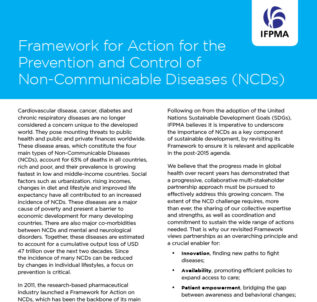Framework for action for the prevention and control of non-communicable diseases

Cardiovascular disease, cancer, diabetes and chronic respiratory diseases are no longer considered a concern unique to the developed world.
They pose mounting threats to public health and public and private finances worldwide. These disease areas, which constitute the four main types of Non-Communicable Diseases (NCDs), account for 63% of deaths in all countries, rich and poor, and their prevalence is growing fastest in low and middle-income countries. Social factors such as urbanization, rising incomes, changes in diet and lifestyle and improved life expectancy have all contributed to an increased incidence of NCDs. These diseases are a major cause of poverty and present a barrier to economic development for many developing countries.
There are also major co-morbidities between NCDs and mental and neurological disorders. Together, these diseases are estimated to account for a cumulative output loss of USD 47 trillion over the next two decades. Since the incidence of many NCDs can be reduced by changes in individual lifestyles, a focus on prevention is critical.
Framework for Action on NCDs
In 2011, the research-based pharmaceutical industry launched a Framework for Action on NCDs, which has been the backbone of its main contribution to World Health Organization’s Global Action Plan on the Prevention and Control ofNCDs, guiding our industry’s activities to tackle the rise of NCDs over the last few years. Since launching the Framework, IFPMA has built valuable alliances with several stakeholders to address NCDs, while engaging in activities that deliver value to governments, health professionals and patients.
Following on from the adoption of the United Nations Sustainable Development Goals (SDGs), IFPMA believes it is imperative to underscore the importance of NCDs as a key component of sustainable development, by revisiting its Framework to ensure it is relevant and applicable in the post-2015 agenda.
We believe that the progress made in global health over recent years has demonstrated that a progressive, collaborative multi-stakeholder partnership approach must be pursued to effectively address this growing concern. The extent of the NCD challenge requires, more than ever, the sharing of our collective expertise and strengths, as well as coordination and commitment to sustain the wide range of actions needed. That is why our revisited Framework views partnerships as an overarching principle and a crucial enabler for:
- Innovation, finding new paths to fight diseases;
- Availability, promoting efficient policies to expand access to care;
- Patient empowerment, bridging the gap between awareness and behavioral changes;
- Capacity building, preparing health systems to manage life-long conditions.



